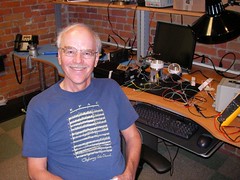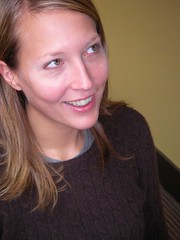Seattle Pics 1st Avenue
August 14th, 2006
A few snaps I took while wandering up 1st Avenue last Thursday evening.
Hugh's Page
A few snaps I took while wandering up 1st Avenue last Thursday evening.
 I spoke to Ian just after an employment contract from Exbiblio had landed on his desk. He has been working as a freelancer here since April – an experience which he compares to dating before marriage.
I spoke to Ian just after an employment contract from Exbiblio had landed on his desk. He has been working as a freelancer here since April – an experience which he compares to dating before marriage.
“It was an opportunity to make sure that we had same intentions and same desires and could tolerate each others’ quirky behaviour,” he says.
I remark on Ian’s unmatched red and yellow socks, but he says his quirkiness goes further than them: he doesn’t posses a good poker face, he says, and wears his emotions on his sleeve. Today he seems to be in a buoyant mood, talking rapidly while fidgeting with a springy plastic toy.
“I like lots of explicit communication,” he adds. “So when Ed [Mahlum] came to me and said ‘We want to make you an offer’, I was happy to be invited to be part of the tribe: I like that, but I had a lot of concerns because our relationship is going well, and why change it? How is our relationship going to be different after this change?”
Ian wanted to iron out any potential misunderstandings with his new employer along the lines of:
“If you are imagining I’m going to be come in at 8 in the morning because I’m an employee, then that’s interesting for me to know. And if I imagine that you’re going to put me in charge of strategic development now that I’m an employee, then that’s interesting for you to know.”
I point out that under the laws of Washington State, employees have no more protection from being fired than contractors (I have this from no lesser authority than Exbiblio’s founder, Martin King, himself). Ian agrees, but he sees the contract as being “statement of intention” to make the relationship long term.
“So long as we’re in a contracting relationship, the implication is that we are just sleeping together: it doesn’t mean a thing and I don’t want to meet your family. This (employment) is the way in our culture that you say I like your tribe. I want to be part of your tribe, and I intend to stay with you. 
Ian admits that he sometimes has less than smooth relations with Exbiblio’s founder, Martin King. He says it’s nothing more than the usual run of things, but adds that this “statement of intention” protects himself from a rash decision on his own part to leave suddenly. He also believes it protects Martin from a rash decision to fire Ian. But he concedes it gives him no long term employment security.
“If a contractor is feeling upset, it’s easy to say, ‘You know what? I’ve got other things to do. God be with you. I’m on my way.’ As an employee, Ian says he will “ride things out for a while,” when they aren’t going well. He hopes that a fast growing company will give him plenty of opportunity to move around and develop. He can work on both software and hardware and he would like to manage projects.
Ian’s been in a management roles before, and he recognises that managers value reliability and predictably more than technical brilliance. A manager wants to know that an assignment is going to be done, and if it isn’t, to be warned in good time and given a reason. This can be difficult in a technical environment where the tendency is to do “cool thing” and really stretch to pull something out of the hat at the last moment.
He says that Exbiblio is unusual because the financial backer is the “wacky inventor” in the person of Martin. Usually shareholders or venture capitalists are pushing for a safer and more boring approach. Martin is always shooting for the heights. Ian finds that it’s new for him to discover that he is taking a more conservative view than the manager. But that’s one of things he likes about Exbiblio. “In the end, I want a story to tell. A good story is either a massive success or a massive failure, but not putt, putt putt putt…..’
 Seattle has more than a smattering of world famous businesses: Boeing, Amazon, Starbucks and Microsoft. Are the citizens of Seattle justly proud of their global titans? Not if the employees of Exbiblio are anything to go by. In particular, Microsoft and Starbucks don’t have a great name around the office. In contrarian spirit, here’s a defence from a visiting Londoner of these two Seattle home-growns.
Seattle has more than a smattering of world famous businesses: Boeing, Amazon, Starbucks and Microsoft. Are the citizens of Seattle justly proud of their global titans? Not if the employees of Exbiblio are anything to go by. In particular, Microsoft and Starbucks don’t have a great name around the office. In contrarian spirit, here’s a defence from a visiting Londoner of these two Seattle home-growns.
Microsoft
No self respecting Exbiblio staffer would be seen dead with a PC type laptop in his/her hands. Apple is the constantly worshipped at the Exbiblio shrine. By implication, and sometimes more explicitly, Microsoft is given the thumbs down. But I would argue that the raw, competitive capitalist drive of Microsoft has done more good for the world than almost any other company over the last 20 years. The combination of Windows and a PC box has has brought cheap computing to the world. Factories in Taiwan and elsewhere in Asia turn out millions and millions of low cost PCs that are affordable for ordinary people, ordinary schools, ordinary hospitals. Those Asian PC assembly businesses would never have taken off without an operating system that they could use as just another component. Microsoft has brought us close to the vision of a PC on every desk and has truly changed the world for the better.
By contrast, what has Apple done for the world? It’s produced admittedly sleek and stylish computers with nice interfaces that look really cool – but at a price. In truth, Macs are fashion statements for rich bohemians. Apple is greedy. It wants the margin from the box and the software. It charges a premium for looks. Apple never has had and never will have the democratizing effect of Microsoft.
Starbucks.
I admit that this Seattle business does not make the best coffee ever tasted, but it has spread the coffee culture around the globe. Before the arrival of Starbucks in London, the “greasy spoon” culture reigned supreme. You were offered of a strong cup of tea (the color of coffee) and egg and chips. Starbucks has spawned many imitators and those who have sought to improve on its formula. But the original Starbucks still has one of the best reputations as an employer and it shows. Here in Seattle you do at least get served in Starbucks. At a more trendy coffee shop I waited almost 20 minutes for just a cup of coffee. I couldn’t understand how they get any repeat custom, but passing by the next day I saw they that drew a crowd of customers patiently waiting to be served. I happily walked past to my friendly service, comfy-armchair, and mediocre cup of coffee at Starbucks.
All in all, I think Seattle should be proud of its contribution to the world via these companies. You don’t have to agree with me – that’s what the comment box is for…
 Tommy describes himself as an “all purpose engineer”. He notes that you don’t see many job advertisements for someone with such a broad qualification. Usually employers are looking for someone to fill a specific role. Still, he believes there is real value in being able see the big picture, and find trade-offs between the hardware and the software. With the perspective arising from a background in mathematics and physics, Tommy has found more similarities between the disciplines than differences.
Tommy describes himself as an “all purpose engineer”. He notes that you don’t see many job advertisements for someone with such a broad qualification. Usually employers are looking for someone to fill a specific role. Still, he believes there is real value in being able see the big picture, and find trade-offs between the hardware and the software. With the perspective arising from a background in mathematics and physics, Tommy has found more similarities between the disciplines than differences.
Tommy is a freelance consultant who is helping Exbiblio with its hardware project. During his career, he’s had many jobs, both employed and freelance. His first job in 1969 was with a company that was trying to make a commercial success out of holography. It didn’t. Later he worked for a firm in Florida that was doing lots of things for the “secret guys” during the cold war. He moved to Texas to join Datapoint, one of the first companies to network computer terminals together. He saw the onset of IBM’s PC and a whiff of scandal destroy Datapoint’s value from $800m to next-to-nothing.
“I got to watch what happens when greed takes over in a company, and people start to do stupid things. Sometimes wealth and position don’t imply wisdom,” he says.
Another lesson for Tommy over the years has been that when the going gets tough for a company, the R&D people are the first out on the street, but he’s learned that he can survive the ups and downs of working in the technology industry.
Here in Seattle, Tommy has worked for the city’s richest and most famous son: Bill Gates. He was part of the team that developed the technology for Gates’s house. He worked on the tracking technology that follows people around the house. Among other things, it switches around the pictures on the walls. The spec for the project changed as Gates acquired a wife and child before the house was finished. He was present at some meetings with Gates and saw his style at first hand:
“He would ask a few narrowly focused question to make sure everybody was on their toes, provide a little bit of feedback, and then he got out of the way.”
Tommy says that the fast schedule of the Exbiblio project is fairly typical for a start up. As the deadline approaches for the first prototype of the scanner pen, Tommy predicts how it will turn out:
“I’ve seen it happen dozens of times. Everybody feels that it’s looking good. You’re on schedule. The parts come in. It looks nice and there are pretty pristine circuit boards. And then you turn it on and smoke comes out – that’s figurative smoke. Then usually there are several days of sleepless panic. You rummage through and find all the little things that are wrong – they are usually relatively minor problems, but they can be hard to find. Finally it works, but those circuit boards aren’t so pretty anymore and there’s a hole in the case where you don’t want it.”
A second version will clean up the major issues. A third will sort out some of the commercial problems, factoring in cost and making it practical to produce in large enough quantities: “That third generation is the one that you can have a reasonable expectation of being a successful product.”
As for the potential for Exbiblio’s product, Tommy says, “I think if we can get it out in the market place most of the anticipated uses will be greeted with “okay that’s nice”, and the one that really takes off will be thing that nobody ever thought about – that will be a surprise and it will be fun.”
Where Tommy thinks Exbiblio is more unusual is in its setting out of its corporate culture and values from day one: “Usually that happens by default and the company will take on the personality of the founder or the most dominant person. Here the corporate values seem to be set in place by design not default. That’s unusual for a company of this size where success may be some years away.”
Tommy interests include cycling (he pedals 11 miles into work) and chamber music. He and his wife both play early woodwind instruments, including the recorder, the crumhorn, and the rackett.
“When I was at college I found an old recorder lying around the house. I noodled on it, and still do. Playing chamber music is very satisfying when you are in the right group.” – hence the muscial notes on his t-shirt.
 Lauren runs Exbiblio’s HR and is the office administrator, working primarily with Henry “Hap” Happel, but also helping out everyone when there’s a need.
Lauren runs Exbiblio’s HR and is the office administrator, working primarily with Henry “Hap” Happel, but also helping out everyone when there’s a need.
She was the fifth person to join Exbiblio, back in March just before the company moved to its current base in a stylish former hotel on Seattle’s 1st Avenue. She admits that she and some of the other newcomers did not fully understand what the project was about at the time of joining. Fortunately, Janinne (formally a big part of Exbiblio who moved on recently) did a good job of persuading her that it was going to be exciting. Lauren recalls that the early days involved a great deal of discussion about the project’s direction, but soon the developments started roll, and the prototype designs started appearing. New ideas started to emerge at virtually every company lunch – traditionally held on Wednesdays.
Lauren has used the third party C-Pen to scan notes for the research project into Word. Although this is only the very starting point of Exbiblio’s vision, it was the point at which it all became real for her.
Appropriately, she loves gadgets. Her latest favourite “toy” is the sleek Motorola SLVR phone which incorporates iTunes music software and lots of other “cool stuff.”
Exbiblio’s idealistic culture helps her to feel comfortable working here. “I grew up with my mother who was a nurse. When I first graduated I worked for a medical company where the definite purpose was to make money – I didn’t enjoy that. I enjoyed working in academia where was more a social service.” Lauren respects the way that business is done at Exbiblio – for instance, in her role she can see at first hand that creditors’ bills are paid promptly – instead of leaving payment for as long as possible – an all too common business practice.
Lauren and her husband run a design studio out of their home, and she handles the sales from their website. Her husband has designed concert posters for the likes of REM and Wilco – the latter being one of her favourite bands. Lauren graduated in journalism, and still enjoys writing for herself – mostly essays – and reading social commentaries.
Almost half of all employees say they would accept less pay, if they could work for a socially responsible company, according to a survey by Care2. Even more workers – 73 per cent – say that it’s “very important” to work for a company that’s “socially responsible.”
Companies mentioned by survey-takers as socially responsible included:
I know that Exbiblio would dearly love to be mentioned on that list one day.
Damon joined Exbiblio in June, one of a clutch of recruits who came over from RealNetworks. A friend at Real who was job hunting pointed out the Exbiblio website. Damon was immediately attracted by Exbiblio’s culture, vision, and the direction it wanted to go in with its technology.
“It’s a big vision. It’s a vision that isn’t limited to ‘We are going to make blog writing easier’, or ‘We are going to let you buy coffee’ or ‘find cheapest tickets’, but it is, “We are going to do something epic for humanity.'”
He also liked the idea that it involved real technical challenges that needed to be overcome, and which would establish Exbiblio as a leader in its field.
Damon’s particular role is to work on the search and indexing side of Exbiblio’s project. Without going into detail – Exbiblio’s index will work in a way that is substantially different for others currently in use. He has been given a deadline of the end of August for the first working model that can be put on desktops internally. When you consider that Damon only arrived in June, that deadline is rather tight.
He describes the current work as “drastically trying to pull something together that demonstrates the vision in a short space of time.” The early results will involve some trade-offs, but the aim is have a proof-of-concept that can attract funding if necessary.
He compares the current state of Exbiblio to the early days of personal computing, where the vision of a computer on every desk was in the province of geeks, and not really understood by the business community.
“Before you cross an ocean, you have to build a boat,” he says.
While Damon has been at Exbiblio, there’s been a lot of lively discussion that could have pulled the project off in a variety of directions. Even now there there are developments afoot that could change or add substantially to the vision.
He likes the fact that the destination of this particular journey is not always clearly in view.
“If you are walking towards a peak, the journey is not so interesting because your focus is always drawn to that end point. If we wander on the way, we will have some adventures. We might find that that peak we’re headed towards is not what we want. Perhaps we will find a lovely waterfall on the way up to this peak, and decide that in fact, that’s what we want after all.”
 Ed played violin and piano while growing up, and later trained as an audio engineer working in television on soap operas and cartoons. In 2000, while visiting London’s Millenium Dome, he was inspired by a Japanese music installation to try his hand in interactive art. One of his projects involved hooking sensors to his body, and making computer music from the galvanic skin response from his fingertips. At the same time he was working towards a PHD in digital art, but be became “burned out” by academia and decided to look for a job.
Ed played violin and piano while growing up, and later trained as an audio engineer working in television on soap operas and cartoons. In 2000, while visiting London’s Millenium Dome, he was inspired by a Japanese music installation to try his hand in interactive art. One of his projects involved hooking sensors to his body, and making computer music from the galvanic skin response from his fingertips. At the same time he was working towards a PHD in digital art, but be became “burned out” by academia and decided to look for a job.
It might be that Ed is at Exbiblo by a quirk of fate. He had worked as a teaching assistant on a course at the University of Washington called “Digital Sound Synthesis.” By chance, Exbiblio’s Adam Behringer had attended that same class several years before. He had considered it to be “simultaneously the most useless and useful course he had ever taken”. When he saw Ed’s application, he decided that he probably wasn’t qualifed for the job in question, but was intrigued enough to meet him. During the job interview, they spent about 90 minutes trying to find a role for Ed and settled on “assistant blog master”. But the blogs initative fizzled out for a while, and Ed ended up helping with the code on the software project named “Kibble”.
Previously Ed had programmed computers “in the service of art”, and so writing code is not quite as far as it might seem from his background in the Arts. The work is very immediate. Usually he responds to requests when somebody says, “Hey can you do this? Or fix that?”.
As for Exbiblio’s office culture, he says he can’t really judge it – as he’s never worked in an office before – “but people tell me it’s unconventional.”
Longer term, Ed sees his role growing into the social media side of Exbiblio. Initially he was attracted to the idea of using Exbiblio technolgy to explore literature and the arts, perhaps working closely with academia, and “revitalising literature for the new age.” Now even wider vistas appear to be opening up, but that’s a story for another time.
There’s a new twist to the story about tantalum, a surprisingly controversial mineral used in capacitors (for background see my previous post, Cruelty-Free Tantalum).
The Sunday Times reports that coltan (columbite-tantalite ore) is being used as a cover to smuggle Uranium from the Congo to Iran via Tanzania. The newspaper quotes a senior Tanzanian source:
There were several containers due to be shipped and they were all routinely scanned with a Geiger counter,” the official said.
“This one was very radioactive. When we opened the container it was full of drums of coltan. Each drum contains about 50kg of ore. When the first and second rows were removed, the ones after that were found to be drums of uranium.”
As you are probably aware, there is widespread concern about Iran’s use of nuclear technology. This latest story will do more to taint the use of Congolese tantalum as being unethical, despite the official end to the civil war in Congo and the recent widely-praised elections. As it happens, I’m told that Exbiblio is avoiding the use of tantalum altogether, which neatly sidesteps the problem.
Publishing giant HarperCollins has announced a deal with iAmplify to offer audio and video content along side books. It will provide free audio interviews as well as paid-for content that adds a new dimension to the words on the printed page. I quote from the press release:
“We are moving towards a new distribution model where content is available to consumers on demand,” Hidary added. “iAmplify provides digital content in any format and on any device – not only to iPods, but also to laptops and cell phones – that consumers can access digitally anytime, anywhere.”
Now imagine just how much more powerful this development would be if readers could swipe a hyperlink in the paper book and be whisked to a multi-media digital experience – for that is exactly the Exbiblio vision.
At the same time, HarperCollins is launching a “browse inside” feature for a range of titles on its website. It’s already including audio extracts (example from Isabel Allende’s Zorro). The browse feature, which aims to give online book-buyers a similar experience to thumbing volumes in an bookshop, was pioneered by Amazon, and emulated more recently by Google Books. It does not quite fulfill the Exbiblio vision of a digital text that a reader can place in a “Life Library”, but it is a significant move by a book publisher in that direction.
Meanwhile the New York Times reports that publishers are using video services such as YouTube to promote books. Companies like Expanded Books will make video promotions for around $4000. Top blog Gawker calls a video trailer for your book, “The hottest new marketing trend.”
Jeff Jarvis, one of the most widely read bloggers, talks of “exploding books” and says “authors are breaking free of paper.” Jarvis is perhaps a little bit too hasty to write the old-fashioned book off just yet (see Penguin’s best selling performance). Another way of looking at this is to say that paper is not “dead wood”, but is finding a new lease of life by becoming integrated with the digital world.